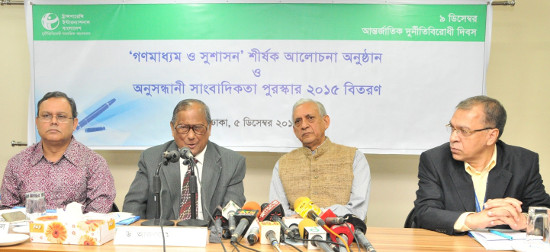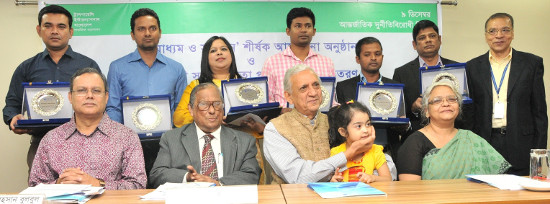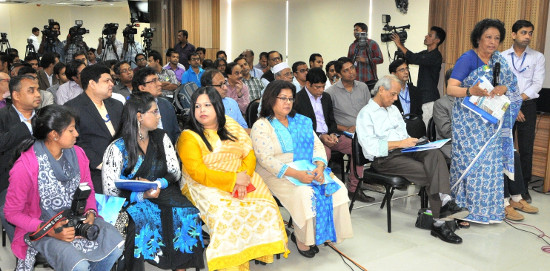Published: 05 December 2015
 As part of it's four-day long celebration of International Anti-corruption Day which falls on 9 December, Transparency International Bangladesh (TIB) today announced the winners of the 17th Investigative Journalism Awards. A discussion meeting on 'The media and good governance' was also held in Meghomala Conference room of it's Central Office in Dhanmondi this morning.
As part of it's four-day long celebration of International Anti-corruption Day which falls on 9 December, Transparency International Bangladesh (TIB) today announced the winners of the 17th Investigative Journalism Awards. A discussion meeting on 'The media and good governance' was also held in Meghomala Conference room of it's Central Office in Dhanmondi this morning.
 In the national print media category, the prize was won by daily Prothom Alo's Senior Reporter Rozina Islam. In the electronic media category, reporters Mizan Malik and Sajjad Parvez from Jamuna Television won, while the camera person Kazi Mohammad Ismiel from the same TV station was also awarded. For the first time, TI Bangladesh introduced investigative journalism awards for climate finance governance category and it was won by reporter G M Mostafizul Alam and cameraperson Jahangir Alam Ratan of Channel 24. For not meeting the required standard, the members of the Jury Board couldn't select winners in local level print and print media national on climate finance governance categories. Each reporter was awarded a certificate, crest and a prize money of Taka one lakh, while each camera person received a certificate, crest and a prize money of Tk fifty thousand.
In the national print media category, the prize was won by daily Prothom Alo's Senior Reporter Rozina Islam. In the electronic media category, reporters Mizan Malik and Sajjad Parvez from Jamuna Television won, while the camera person Kazi Mohammad Ismiel from the same TV station was also awarded. For the first time, TI Bangladesh introduced investigative journalism awards for climate finance governance category and it was won by reporter G M Mostafizul Alam and cameraperson Jahangir Alam Ratan of Channel 24. For not meeting the required standard, the members of the Jury Board couldn't select winners in local level print and print media national on climate finance governance categories. Each reporter was awarded a certificate, crest and a prize money of Taka one lakh, while each camera person received a certificate, crest and a prize money of Tk fifty thousand.
 TI-Bangladesh's Executive Director Dr Iftekharuzzaman moderated the session where the Prime Minister's International Affairs Adviser Professor Dr Gowhar Rizvi graced the occasion as chief guest, chaired by Dr Akbar Ali Khan, the Member, Board of Trustees, TIB. Noted journalist and Chief Editor of ATN Bangla Monjurul Ahsan Bulbul presented the key-note on 'Media and Governance'. Media personality Muhammad Jahangir, Professor Dilara Chowdhury and Executive Director of Management Resource Development Initiative (MRDI) Hasibur Rahman were among others who participated in the discussion.
TI-Bangladesh's Executive Director Dr Iftekharuzzaman moderated the session where the Prime Minister's International Affairs Adviser Professor Dr Gowhar Rizvi graced the occasion as chief guest, chaired by Dr Akbar Ali Khan, the Member, Board of Trustees, TIB. Noted journalist and Chief Editor of ATN Bangla Monjurul Ahsan Bulbul presented the key-note on 'Media and Governance'. Media personality Muhammad Jahangir, Professor Dilara Chowdhury and Executive Director of Management Resource Development Initiative (MRDI) Hasibur Rahman were among others who participated in the discussion.
Appreciating the valiant role the Bangladesh media have been playing in spite of all odds, Dr Iftekharuzzaman suggested that the government should take tolerant attitude towards criticism from the media. He said TIB's awards have contributed towards building positive changes in investigative journalism in the country.
Professor Dr Gowhar Rizvi said democracy cannot operate without a free media and the government is also aware about this fact. In the present world no government can prevent publication of fact; media will find ways to communicate information to the people. It is not only the government who impedes the media freedom, the challenges also come from the corporate owners of the media, he said.
It may be mentioned here that TI-Bangladesh's media engagement programme has three components: Investigative Journalism Awards, investigative journalism training and investigative journalism fellowship. The objectives of TI-Bangladesh's media engagement programmes are: to build media’s capacity to produce quality reports on governance and corruption issues and creates public opinion against corruption to spread the messages of anti-corruption social movement.
Since 1999, TI-Bangladesh has awarded 44 journalists, trained more than 300 journalists outside the capital since 2010 and offered three fellowships since 2012.
TI Bangladesh was the trend-setter in introducing investigative journalism awards in Bangladesh that created_at a pool of dedicated journalists who are defying all challenges to unmask the corrupt. TI-Bangladesh's model is now being followed by many organizations. Media authorities also value and recognize TI-Bangladesh’s pivotal role in developing the capacity of Bangladesh media.







